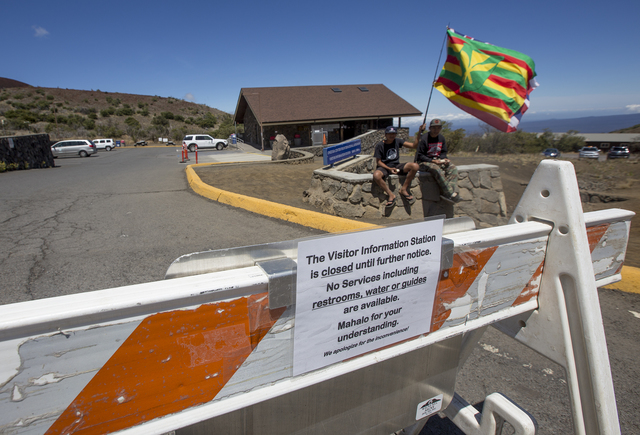Gov. David Ige signed the new emergency rule Tuesday afternoon that prohibits camping and restricts public access on Mauna Kea, the site of ongoing protests against the Thirty Meter Telescope.
Gov. David Ige signed the new emergency rule Tuesday afternoon that prohibits camping and restricts public access on Mauna Kea, the site of ongoing protests against the Thirty Meter Telescope.
Ige said in a statement that the rule, which will remain in effect for 120 days, gives the state an additional tool to keep the road safe for all.
“My administration believes firmly in the right of free expression,” he said. “At the same time we cannot let some people put others at risk of harm or property damage. This temporary rule helps strike that balance. I respectfully ask everyone using the road to exercise caution and obey the law.”
Tuesday’s signature comes one day after the Office of Mauna Kea Management reopened the Mauna Kea Access Road, which was shut down last month following protests against the TMT. Only after the rule is filed with the Office of the Lieutenant Governor will it go into effect.
In addition to prohibiting certain camping gear, including tents, sleeping bags and stoves, the rule restricts being within a mile of Mauna Kea Access Road at night, from 10 p.m.- to 4 a.m., unless in a moving vehicle.
The state Board of Land and Natural Resources approved the rules — meant to deal with what state officials have described as an “imminent peril” to public safety and natural resources resulting from ongoing protests — by a 5-2 vote during its regular meeting Friday in Honolulu.
Those who testified in person during the meeting overwhelmingly were opposed to the rules and the TMT project.
Of the 82 people who testified, 73 were opposed. Seven testified in support and two offered only comments, according to Dan Dennison, a spokesman for the state Department of Land and Natural Resources.
Vehicular access above the Hale Pohaku midlevel facilities will be by four-wheel drive vehicles only. Two-wheel drive vehicles will not be allowed past the end of the paved road at Hale Pohaku, according to officials.
The Visitor Information Station and its restroom facilities remain closed. Restrooms are available at Mauna Kea Recreation Area and Puuhuluhulu at the junction of Saddle Road and Mauna Kea Summit Access Road. Portable toilets for the public are available on the summit.
Email Chris D’Angelo at cdangelo@hawaiitribune-herald.com.

